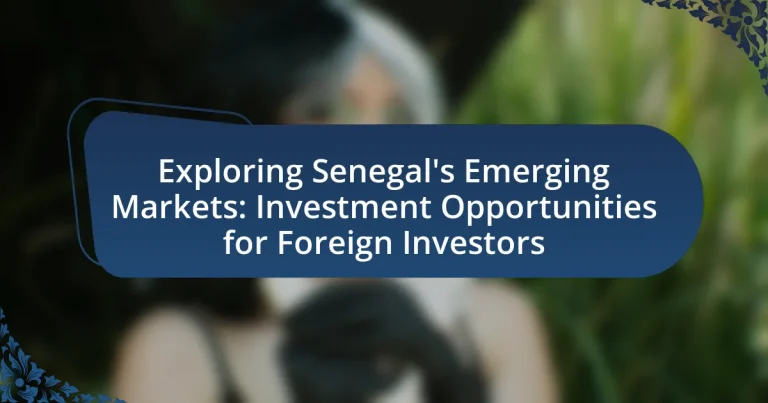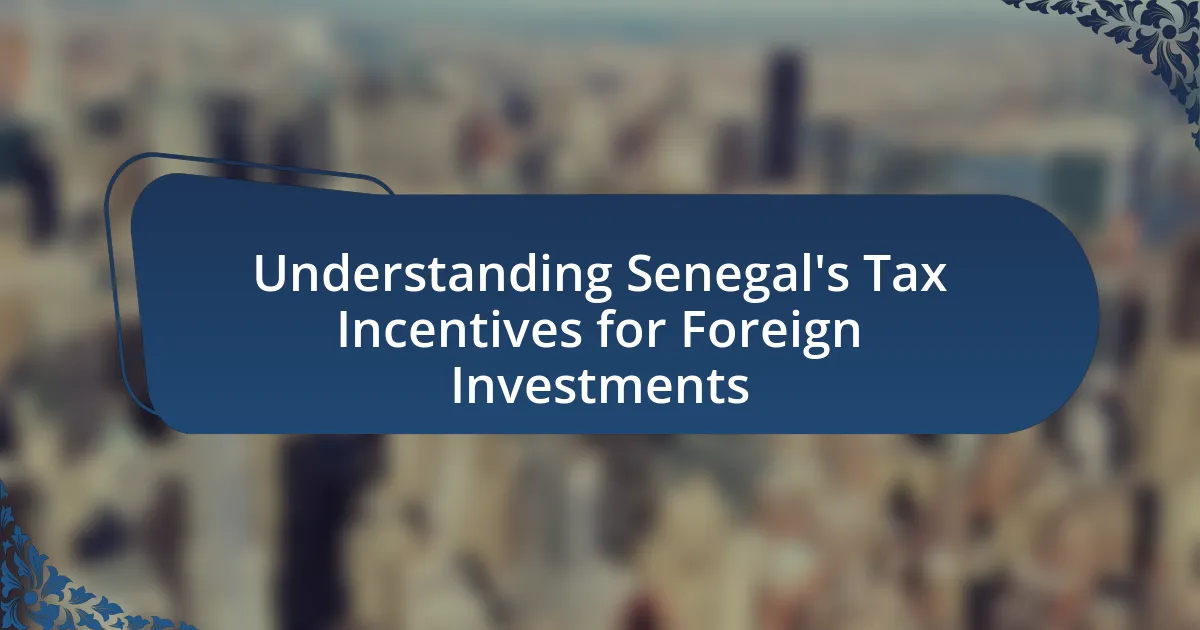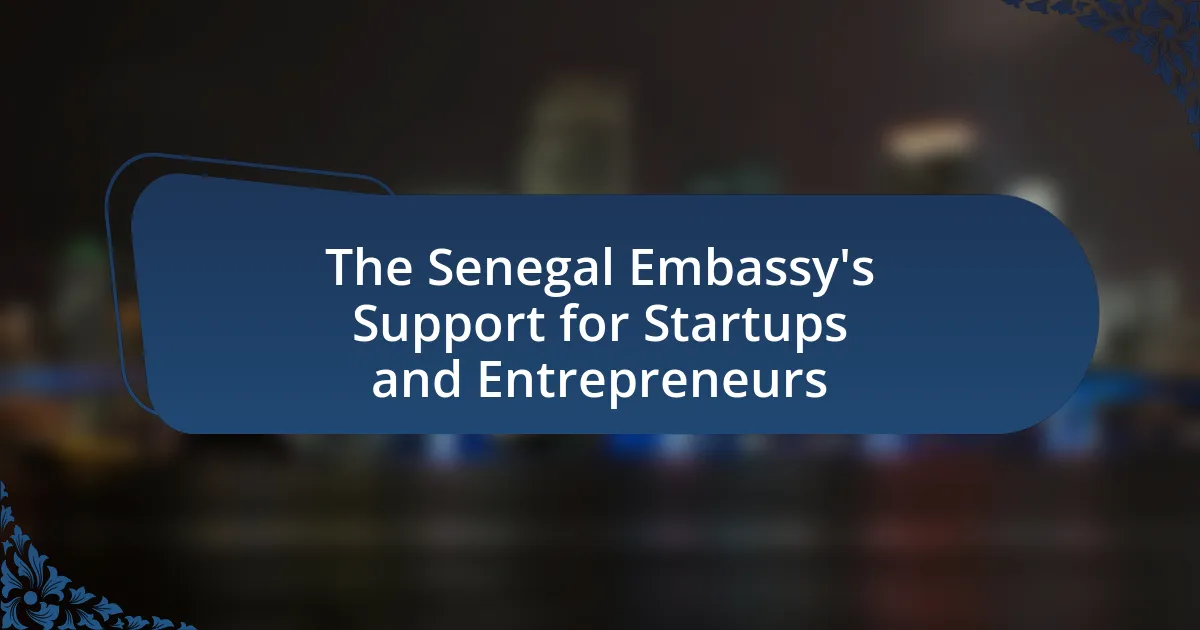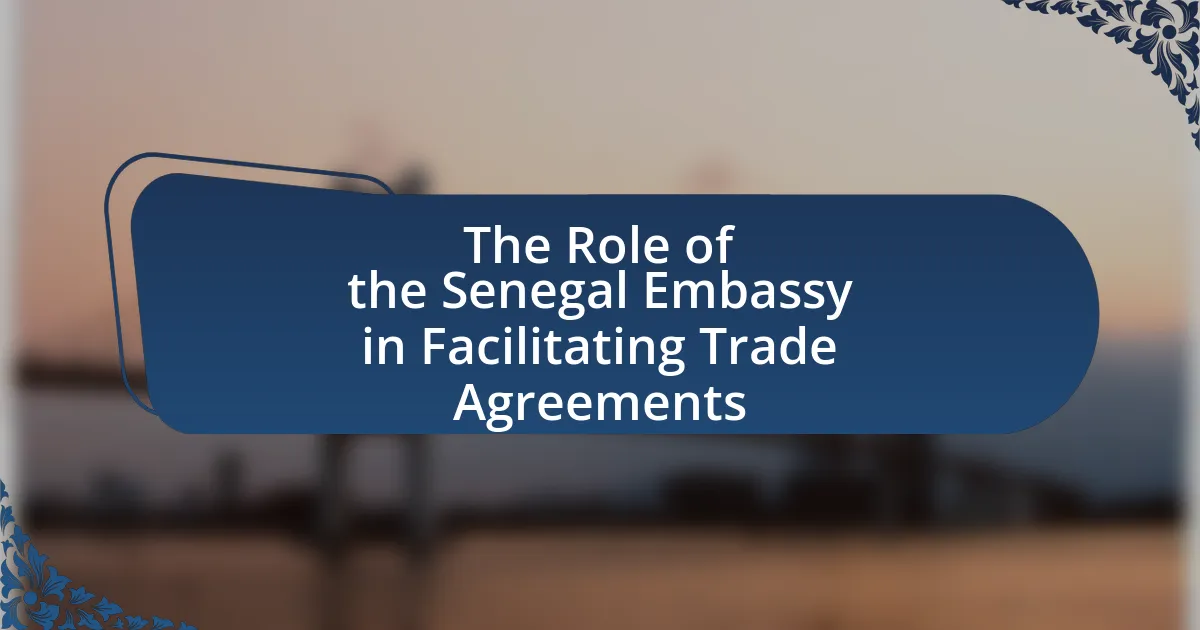Senegal’s emerging markets present significant investment opportunities for foreign investors, particularly in sectors such as agriculture, renewable energy, information and communication technology (ICT), and tourism. The agricultural sector contributes approximately 15% to the GDP and offers potential in agro-processing and exports, while renewable energy initiatives aim for 30% of energy generation from renewable sources by 2025. The ICT sector is expanding rapidly due to increased internet access, fostering innovation and tech startups. Additionally, Senegal’s political stability and strategic geographic location enhance its appeal as a gateway to West Africa, making it an attractive destination for investment despite challenges such as bureaucratic inefficiencies and regulatory hurdles.
What are Senegal’s Emerging Markets?
Senegal’s emerging markets primarily include sectors such as agriculture, renewable energy, information and communication technology (ICT), and tourism. The agricultural sector is significant, contributing to about 15% of the country’s GDP and employing a large portion of the population, with opportunities in agro-processing and export. Renewable energy is rapidly growing, with Senegal aiming to generate 30% of its energy from renewable sources by 2025, creating investment potential in solar and wind projects. The ICT sector is expanding, driven by increased internet penetration and mobile connectivity, fostering innovation and tech startups. Lastly, tourism is a vital area, with Senegal’s rich cultural heritage and natural attractions drawing international visitors, thus presenting opportunities for investment in hospitality and related services.
How do emerging markets in Senegal differ from established markets?
Emerging markets in Senegal differ from established markets primarily in their growth potential and risk profile. Emerging markets, such as Senegal’s technology and renewable energy sectors, exhibit rapid expansion and innovation, attracting foreign investment due to their untapped opportunities. In contrast, established markets, like agriculture and traditional retail, tend to have slower growth rates and are characterized by more stable but lower returns. For instance, Senegal’s GDP growth rate was approximately 6.1% in 2022, driven largely by emerging sectors, while established sectors have shown more modest growth, reflecting their maturity. This distinction highlights the dynamic nature of Senegal’s economy, where emerging markets present higher risks but also greater potential rewards for investors.
What factors contribute to the emergence of these markets?
The emergence of Senegal’s markets is primarily driven by economic growth, political stability, and strategic geographic location. Economic growth in Senegal has been bolstered by a diverse economy that includes agriculture, mining, and services, with GDP growth rates averaging around 6% annually in recent years. Political stability, characterized by a democratic government and peaceful transitions of power, fosters a conducive environment for investment. Additionally, Senegal’s strategic location along the West African coast enhances trade opportunities, attracting foreign investors seeking access to regional markets. These factors collectively create a favorable landscape for the emergence of new markets in Senegal.
How is the economic landscape of Senegal evolving?
The economic landscape of Senegal is evolving positively, characterized by robust growth driven by sectors such as agriculture, mining, and services. The country’s GDP growth rate has averaged around 6% annually over the past decade, supported by government initiatives to enhance infrastructure and attract foreign investment. Notably, the discovery of offshore oil and gas reserves is expected to significantly boost economic activity, with projections indicating that these resources could contribute up to 20% of GDP by 2025. Additionally, Senegal’s strategic location as a gateway to West Africa enhances its appeal for trade and investment, further solidifying its position as an emerging market in the region.
Why should foreign investors consider Senegal’s emerging markets?
Foreign investors should consider Senegal’s emerging markets due to its robust economic growth and strategic geographic location. Senegal has experienced an average GDP growth rate of around 6% over the past decade, driven by sectors such as agriculture, mining, and energy. Additionally, the country is positioned as a gateway to West Africa, facilitating access to a market of over 300 million consumers. The government has implemented reforms to improve the business environment, including the Plan Senegal Emergent, which aims to attract foreign investment and enhance infrastructure. These factors collectively create a favorable landscape for investment, making Senegal an attractive option for foreign investors seeking opportunities in emerging markets.
What unique opportunities do these markets present?
Senegal’s emerging markets present unique opportunities primarily in sectors such as agriculture, renewable energy, and technology. The agricultural sector benefits from a strategic location and favorable climate, allowing for the cultivation of diverse crops, which can attract foreign investment aimed at enhancing productivity and export potential. The renewable energy sector is poised for growth, with Senegal’s government targeting 30% of its energy from renewable sources by 2025, creating investment opportunities in solar and wind projects. Additionally, the technology sector is rapidly evolving, supported by a young, tech-savvy population and increasing internet penetration, which opens avenues for startups and digital services. These sectors are backed by government initiatives and international partnerships, reinforcing their viability as investment destinations.
How does Senegal’s political stability impact investment potential?
Senegal’s political stability significantly enhances its investment potential by creating a favorable environment for foreign investors. A stable political climate reduces risks associated with investment, such as abrupt policy changes or civil unrest, which can deter capital inflow. For instance, Senegal has maintained a democratic governance structure since 2000, characterized by peaceful transitions of power and a commitment to the rule of law, which has been recognized by international observers. This stability has led to increased foreign direct investment (FDI), with the World Bank reporting that Senegal attracted approximately $1.2 billion in FDI in 2020, reflecting investor confidence in its political landscape. Thus, the combination of political stability and a supportive regulatory framework positions Senegal as an attractive destination for investment.
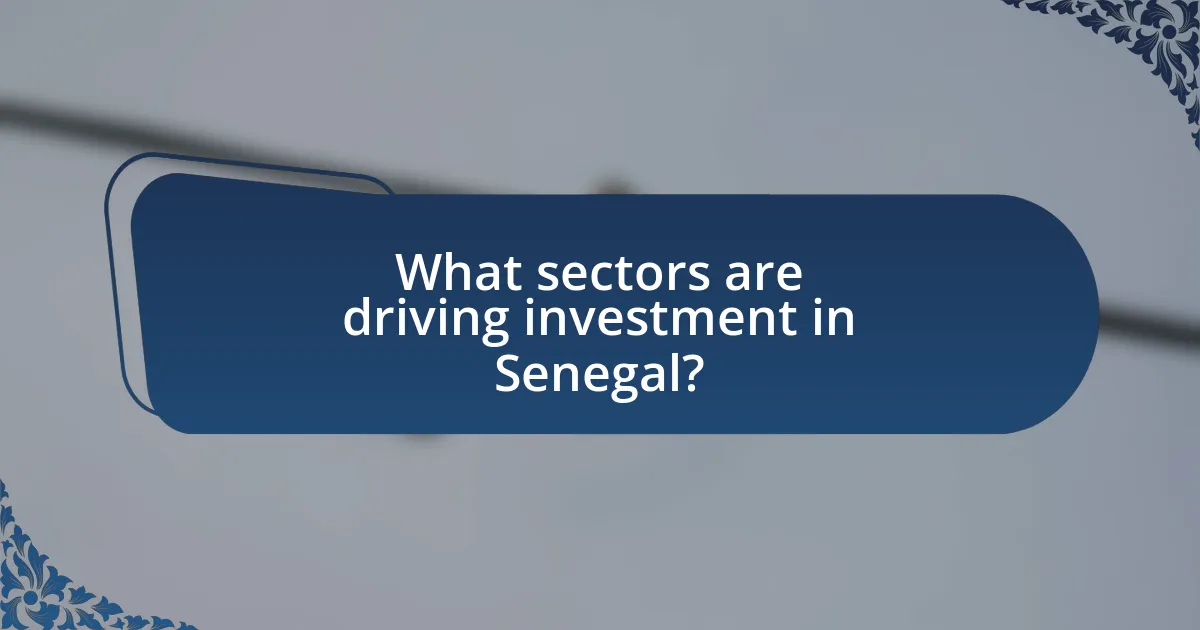
What sectors are driving investment in Senegal?
The sectors driving investment in Senegal include energy, agriculture, and infrastructure. The energy sector is particularly significant due to the government’s focus on expanding renewable energy sources, with projects like the Taiba N’Diaye wind farm, which has a capacity of 158.7 MW. Agriculture remains a vital area, supported by initiatives to enhance food security and export potential, with crops such as peanuts and millet being key contributors. Infrastructure development is also a priority, with investments in transportation and urban development aimed at improving connectivity and economic growth, exemplified by the Dakar-Diamniadio Toll Highway project. These sectors collectively attract both domestic and foreign investments, reflecting Senegal’s strategic economic priorities.
Which industries are most promising for foreign investors?
The most promising industries for foreign investors in Senegal include agriculture, renewable energy, and information and communication technology (ICT). Agriculture is a key sector due to Senegal’s favorable climate and government initiatives aimed at boosting food production, which has seen a 6% annual growth rate in recent years. Renewable energy is gaining traction as Senegal aims to generate 30% of its energy from renewable sources by 2025, supported by investments in solar and wind projects. The ICT sector is rapidly expanding, with a projected growth rate of 10% annually, driven by increasing mobile penetration and digital services. These industries present significant opportunities for foreign investment, backed by government support and favorable economic conditions.
What role does agriculture play in Senegal’s economy?
Agriculture is a crucial sector in Senegal’s economy, contributing approximately 15% to the country’s GDP and employing around 40% of the workforce. This sector not only provides food security but also serves as a foundation for rural livelihoods and economic stability. Key agricultural products include peanuts, millet, and cotton, which are significant for both domestic consumption and export. The importance of agriculture is further underscored by government initiatives aimed at enhancing productivity and attracting foreign investment, thereby fostering growth in this vital economic area.
How is the technology sector evolving in Senegal?
The technology sector in Senegal is rapidly evolving, driven by increased internet penetration and a growing startup ecosystem. As of 2023, Senegal boasts over 60% internet penetration, facilitating access to digital services and fostering innovation. The government has implemented initiatives like the Digital Senegal 2025 strategy, which aims to enhance the digital economy and attract foreign investment. Additionally, the emergence of tech hubs, such as Dakar’s CTIC, supports local entrepreneurs and encourages collaboration. These developments indicate a significant transformation in Senegal’s technology landscape, positioning it as a promising market for foreign investors.
What infrastructure developments are supporting these sectors?
Infrastructure developments supporting Senegal’s emerging markets include the expansion of transportation networks, energy projects, and digital infrastructure. The government has invested significantly in road and rail improvements, such as the Dakar-Diamniadio Toll Highway, which enhances connectivity and facilitates trade. Additionally, the development of the Teranga Gold Mine and the Grand Tortue Ahmeyim gas project demonstrates a commitment to energy infrastructure, aiming to boost production and attract foreign investment. Furthermore, initiatives to improve internet access and mobile connectivity, such as the deployment of fiber optic cables, are crucial for supporting the digital economy. These developments collectively create a conducive environment for investment and economic growth in Senegal.
How do transportation and logistics impact market accessibility?
Transportation and logistics significantly enhance market accessibility by facilitating the movement of goods and services to consumers. Efficient transportation networks reduce delivery times and costs, making products more available to a broader audience. For instance, in Senegal, improvements in road infrastructure and port facilities have led to increased trade volumes, as evidenced by a 20% rise in container traffic at the Port of Dakar from 2018 to 2020. This increased accessibility allows businesses to reach new markets, attract foreign investment, and stimulate economic growth.
What investments are being made in energy and utilities?
Significant investments are being made in renewable energy and infrastructure within Senegal’s energy and utilities sector. The Senegalese government, alongside international partners, is focusing on solar and wind energy projects to diversify its energy mix and enhance energy access. For instance, the Scaling Solar program, supported by the World Bank, aims to develop solar power plants with a target of generating 1,000 MW by 2025. Additionally, the government is investing in the expansion of the national grid and improving energy efficiency, which is crucial for meeting the growing demand for electricity in urban and rural areas. These initiatives are backed by commitments from foreign investors, including major energy companies, indicating a robust interest in Senegal’s energy market.
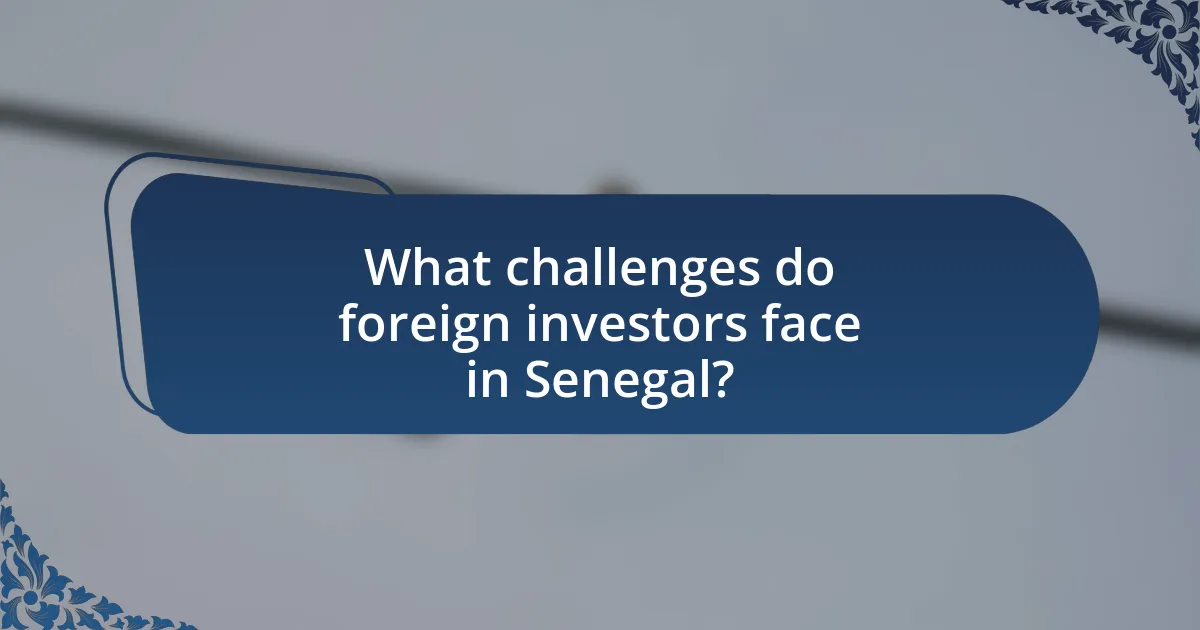
What challenges do foreign investors face in Senegal?
Foreign investors in Senegal face several challenges, including bureaucratic inefficiencies, regulatory uncertainty, and infrastructure deficits. Bureaucratic inefficiencies manifest in lengthy processes for obtaining permits and licenses, which can delay project timelines. Regulatory uncertainty arises from frequent changes in laws and policies, making it difficult for investors to plan long-term investments. Additionally, inadequate infrastructure, particularly in transportation and energy, hampers operational efficiency and increases costs for foreign businesses. These challenges are documented in reports from the World Bank and the International Monetary Fund, highlighting the need for reforms to improve the investment climate in Senegal.
What regulatory hurdles must investors navigate?
Investors in Senegal must navigate several regulatory hurdles, including complex bureaucratic processes, inconsistent enforcement of laws, and a lack of transparency in regulatory frameworks. The Senegalese government has established various laws and regulations aimed at attracting foreign investment, such as the Investment Code, which offers incentives but also requires compliance with specific conditions. Additionally, investors often face challenges related to land acquisition, as land tenure systems can be unclear and subject to local customs. According to the World Bank’s Doing Business report, Senegal ranks 123rd out of 190 countries in ease of doing business, highlighting the regulatory challenges that can impede investment.
How does the legal framework affect foreign investment?
The legal framework significantly affects foreign investment by establishing the rules and regulations that govern investment activities. A robust legal framework provides clarity and predictability, which are essential for foreign investors to assess risks and make informed decisions. For instance, Senegal’s Investment Code offers incentives such as tax exemptions and guarantees against expropriation, which attract foreign capital. Additionally, adherence to international treaties and agreements enhances investor confidence by ensuring that their rights are protected. According to the World Bank’s Ease of Doing Business report, countries with strong legal protections for investors tend to attract higher levels of foreign direct investment, demonstrating the direct correlation between legal frameworks and investment inflows.
What are the common bureaucratic challenges encountered?
Common bureaucratic challenges encountered include lengthy approval processes, lack of transparency, and inconsistent regulatory frameworks. In Senegal, foreign investors often face delays in obtaining necessary permits and licenses, which can extend project timelines significantly. Additionally, the bureaucratic environment may lack clear guidelines, leading to confusion and potential misinterpretation of regulations. According to the World Bank’s Doing Business report, Senegal ranks 123rd out of 190 countries in ease of doing business, highlighting the systemic inefficiencies that can hinder investment.
How can investors mitigate risks associated with emerging markets?
Investors can mitigate risks associated with emerging markets by diversifying their investment portfolios across various sectors and geographic regions. Diversification reduces exposure to any single market’s volatility, as evidenced by studies showing that a well-diversified portfolio can lower risk without significantly sacrificing returns. Additionally, investors should conduct thorough due diligence, including analyzing political stability, economic indicators, and regulatory environments, which can provide insights into potential risks. For instance, the World Bank’s reports on emerging economies highlight the importance of understanding local market conditions to make informed investment decisions. Furthermore, utilizing financial instruments such as options and futures can hedge against currency and market fluctuations, thereby providing an additional layer of protection.
What strategies can be employed to ensure successful investments?
To ensure successful investments in Senegal’s emerging markets, investors should employ strategies such as thorough market research, diversification of investment portfolios, and establishing local partnerships. Conducting comprehensive market research allows investors to understand the economic landscape, regulatory environment, and consumer behavior, which is crucial for making informed decisions. Diversification mitigates risks by spreading investments across various sectors, reducing the impact of poor performance in any single area. Furthermore, forming partnerships with local businesses can provide valuable insights and facilitate smoother navigation of the local market dynamics, enhancing the likelihood of investment success. These strategies are supported by the growing interest in Senegal’s economy, which has seen a consistent GDP growth rate of around 6% annually, indicating a favorable environment for investment.
How important is local partnership in overcoming challenges?
Local partnership is crucial in overcoming challenges in Senegal’s emerging markets. Collaborating with local entities provides foreign investors with essential insights into cultural nuances, regulatory frameworks, and market dynamics. For instance, a study by the World Bank highlights that local partnerships can enhance project success rates by up to 30% due to improved stakeholder engagement and resource allocation. This evidence underscores the importance of local partnerships in navigating the complexities of Senegal’s investment landscape.
What best practices should foreign investors follow in Senegal?
Foreign investors in Senegal should prioritize understanding the local regulatory environment and engaging with local partners. Familiarity with Senegal’s investment laws, such as the Investment Code, which offers incentives like tax exemptions, is crucial for compliance and maximizing benefits. Additionally, forming partnerships with local businesses can facilitate market entry and provide insights into consumer behavior and cultural nuances. Engaging with the Senegalese government and relevant agencies, such as the Senegalese Agency for Promotion of Investments and Major Projects, can also enhance investor credibility and access to resources. These practices are supported by Senegal’s growing economy, which has seen a GDP growth rate of approximately 6% annually, indicating a favorable investment climate.
How can investors conduct effective market research?
Investors can conduct effective market research by utilizing a combination of qualitative and quantitative methods to gather relevant data about Senegal’s emerging markets. This includes analyzing economic indicators, such as GDP growth rates, inflation, and foreign direct investment trends, which provide insights into market potential. Additionally, investors should engage with local stakeholders, including businesses and government officials, to understand regulatory environments and cultural nuances that may impact investment decisions.
For instance, the World Bank reports that Senegal’s GDP growth was approximately 6.1% in 2021, indicating a robust economic environment for investment. Furthermore, utilizing tools like surveys and focus groups can help investors gauge consumer preferences and market demand. By synthesizing this information, investors can make informed decisions that align with the unique opportunities present in Senegal’s market landscape.
What are the key considerations for building local relationships?
Key considerations for building local relationships in Senegal’s emerging markets include understanding cultural norms, establishing trust, and engaging in community involvement. Cultural norms dictate communication styles and business practices, making it essential for foreign investors to adapt to local customs to foster positive interactions. Establishing trust is crucial, as relationships in Senegal often rely on personal connections; therefore, investing time in face-to-face meetings can enhance credibility. Community involvement demonstrates commitment and respect for local values, which can lead to stronger partnerships and better business outcomes. These considerations are supported by research indicating that successful foreign investments in Senegal often stem from strong local relationships, highlighting the importance of cultural integration and trust-building in the investment process.
